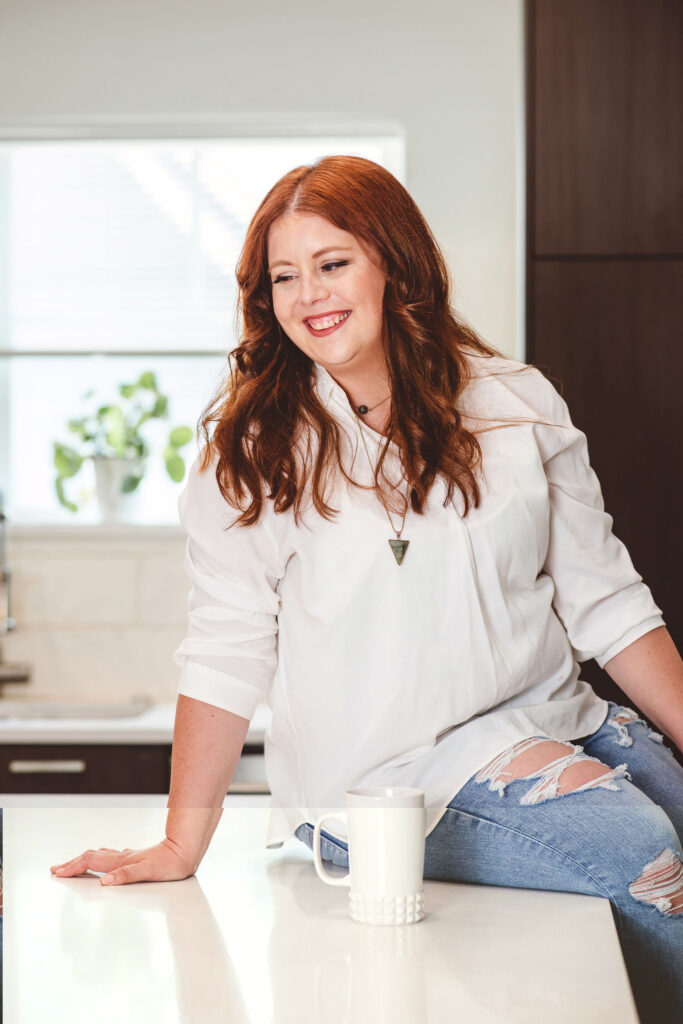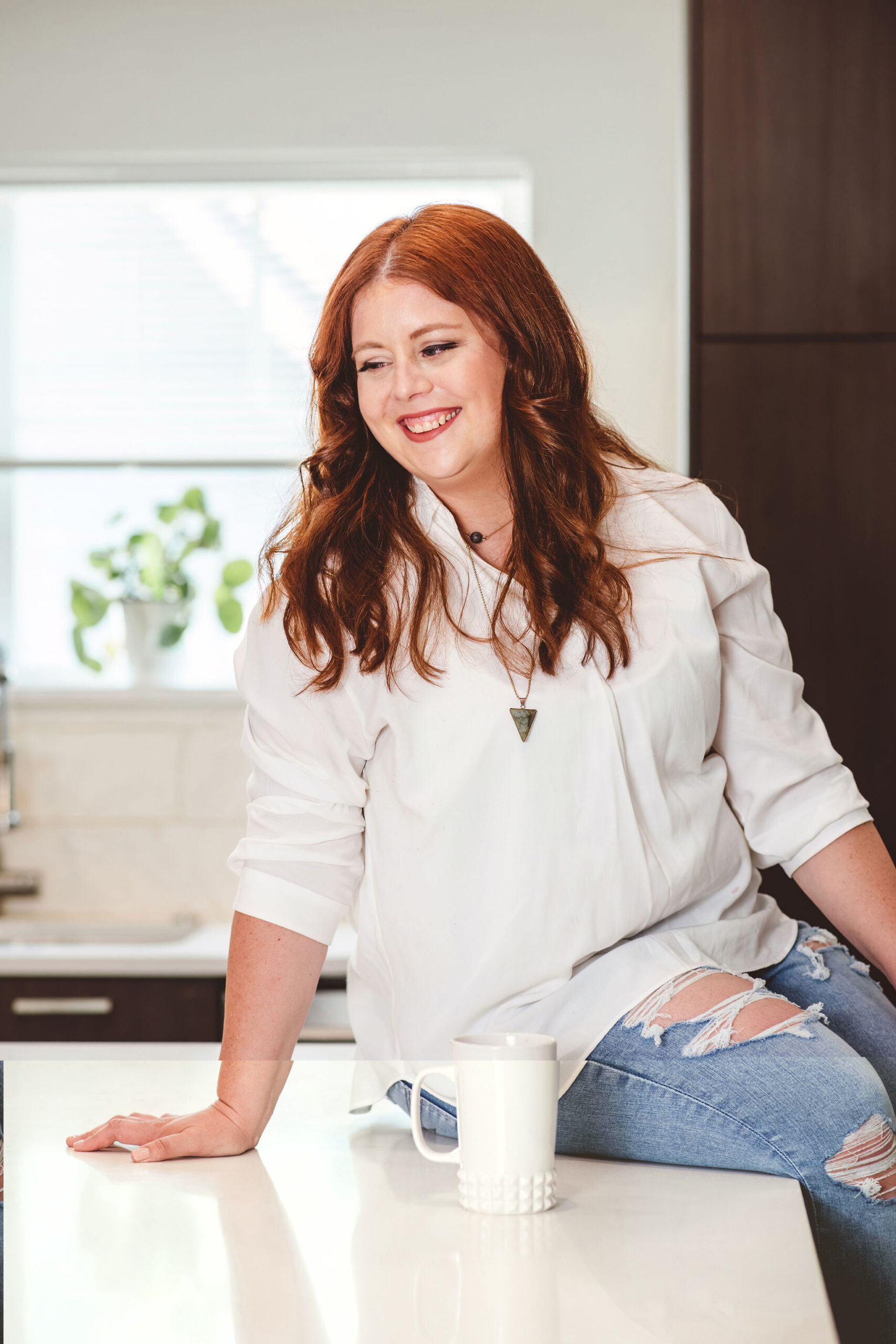Have you ever asked yourself, “why can’t I stop eating?” Maybe it happens at night, when things quiet down, and you find yourself eating again even after promising you wouldn’t.
If this feels familiar, you’re not alone. And no, it’s not about willpower or weakness. It is a protective response. Your body is trying to cope, not failing.
In this blog, we’ll look at what is really going on beneath the surface. You’ll learn why eating in ways that feel out of control often makes sense, how diet culture adds to the struggle, and why compassion is the key to healing.
Hi, I’m Meredith MacKenzie, a binge eating therapist, intuitive eating coach, and creator of the One Body To Love program. If you’ve been asking, “why can’t I stop eating?” and feel stuck in guilt, shame, or the need to control food, you’re not alone. Your eating makes sense, and healing starts with compassion, not control. I help women break free from the binge-restrict cycle and rebuild trust with food and their bodies. For daily support and honest conversations, come join me on Instagram.

The Willpower Myth Explained
Many people think overeating is a willpower issue. If you could just try harder or be more disciplined, you’d stop eating so much. But that belief causes harm.
The truth is, willpower isn’t the problem. Fighting your body’s signals only makes things harder. You might hold it together all day, then lose control at night. That’s not weakness. It’s your body responding to unmet needs like hunger, stress, and emotional overload.
If you’re still asking, “why can’t I stop eating?” the answer isn’t failure. It’s protection. Your body is trying to take care of you, even if it doesn’t feel that way yet.
If you’ve ever tried to use willpower to stop secret eating and felt like you failed, this video is for you. I explain why self-control isn’t the answer, and what actually helps instead.
Survival Patterns and Protective Coping
When eating feels out of control, it’s easy to blame yourself. But what if your eating is your body’s way of coping?
Here are some common survival patterns with food:
- Eating for comfort: Food soothes stress, sadness, or loneliness when life feels heavy.
- Eating after restriction: Dieting or “being good” can trigger your body to seek more food later.
- Eating to feel safe: Food may be the one place that feels calming when emotions run high.
- Eating out of habit: Your brain learns that food brings relief, even when you’re not hungry.
- Eating to escape: Food can be a way to check out from pressure, perfectionism, or emotional overload.
If you’re asking, “why can’t I stop eating?” your eating may be a sign of protection, not a problem. Something deeper may need care, not control.
Diet Culture’s Role in the Struggle
Diet culture is all around us. It teaches that thinner is better, and that being in control of food means being worthy. These messages shape how you see yourself and your eating, often without you even noticing.
Here’s how diet culture fuels the struggle:
- Ignores hunger: Diets tell you to follow rules, not your body. This breaks your trust in hunger and fullness.
- Creates guilt: Foods become “good” or “bad,” which adds shame and stress to eating.
- Triggers scarcity: Even thinking about dieting can make your body want more, fast.
- Feeds all-or-nothing thinking: One “off” choice feels like failure, leading to more bingeing.
- Blocks deeper needs: When focused on shrinking your body, it’s harder to hear what you truly need.
When wondering “why can’t I stop eating?”, know that diet culture plays a big part. Healing begins when you stop following its rules and start listening to your body.
Ready to dig deeper into how diet culture hides in everyday wellness advice? Check out this blog post to learn how to spot sneaky diet messages, even in spaces that claim to be all about health.
“Why Can’t I Stop Eating?” The Role of Perfectionism and Control
For many women, food struggles are closely tied to perfectionism. You may hold high standards, care for others, and work hard to get things “right.” That same mindset can shape how you approach eating.
Trying to eat perfectly can feel safe at first, but over time, it becomes exhausting. The more you try to control food, the more it begins to control you.
Perfectionism leaves little room for being human. One “off” choice can feel like failure, leading to guilt, shame, and the “might as well” spiral. It is not about lacking discipline. It is about the pressure to always get it right.
If you can’t stop eating, consider how perfectionism might be part of the story. Food is not the enemy. It is often where the pressure shows up. Letting go of the need to be perfect creates more space for self-trust and care.
If you’re wondering what to do after a binge, this blog offers a gentle, step-by-step guide to help you respond with care instead of shame.
Building Trust and Safety with Food
If you have spent years stuck in the binge-restrict cycle, your relationship with food might feel confusing or even scary. You may feel like you cannot trust yourself around certain foods. You may wonder if giving yourself permission to eat will make things worse. This is a normal fear, especially if you have learned to view food as something that must be tightly controlled.
The truth is, your body is not the enemy. It wants to feel safe. And safety comes from consistency, not punishment. When you give yourself regular meals, enough food, and permission to eat what satisfies you, your body begins to calm down. It no longer needs to scream for food or push back against restriction.
Trust takes time. It is built through small, repeated moments of care. Eating a snack before you get overly hungry. Letting yourself enjoy dessert without guilt. Reminding yourself that one meal will not ruin everything. These steps may feel uncomfortable at first, but they are part of healing.
When you can’t stop eating, the answer may be that your body is asking for more safety, not more control. The more you offer it trust, the less it needs to rebel.
If you’re tired of swinging between restriction and bingeing, this video breaks down how to step out of the cycle without cutting off the foods you love.
How Compassion Heals What Control Cannot
When eating feels out of control, many women respond by tightening the rules. But the more you try to control food, the more disconnected you may feel from your body.
Control often comes from fear. Fear of gaining weight. Fear of judgment. Fear of what might happen if you let go. But fear creates stress and shame, not lasting change.
Compassion offers something different. It invites you to pause and ask, “What do I need right now?” It helps you respond with care instead of criticism.
When you meet yourself with kindness, eating becomes less about failure and more about understanding. You begin to give yourself what you truly need, whether that is food, rest, or support.
So if you have been asking, “why can’t I stop eating?” try asking this instead. What if I stopped fighting and started listening? That is where healing begins.
If you’re feeling stuck in the “why can’t I stop eating?” cycle, this quick video can help.
Still Wondering “Why Can’t I Stop Eating?” Here’s What to Remember
If you keep asking yourself, “why can’t I stop eating?” know that you are not alone, and you are not broken. What feels like a problem is often a sign of deeper needs, protective patterns, and years of mixed messages from diet culture. Your eating is not about willpower or weakness. It is about survival, safety, and the ways your body has learned to cope.
If you’re feeling stuck in the “Why can’t I stop eating?” cycle and worn down by years of trying to control your food or fix your body, you’re not alone. The truth is, your eating makes sense. Healing begins with curiosity and compassion, not more rules.
My small group coaching program, One Body To Love, offers a supportive space to step out of the binge-restrict cycle, let go of harmful food beliefs, and rebuild trust in your body without pressure to change your weight.
If you’re looking for more personal support, 1:1 coaching gives you a safe space to explore your eating patterns and create a new path that feels calm and sustainable.
Not sure where to start? Book a free discovery call and let’s talk about what kind of support might be right for you.
You can also listen to the One Body To Love podcast or visit my YouTube channel for real conversations, helpful tools, and stories to guide your journey.
